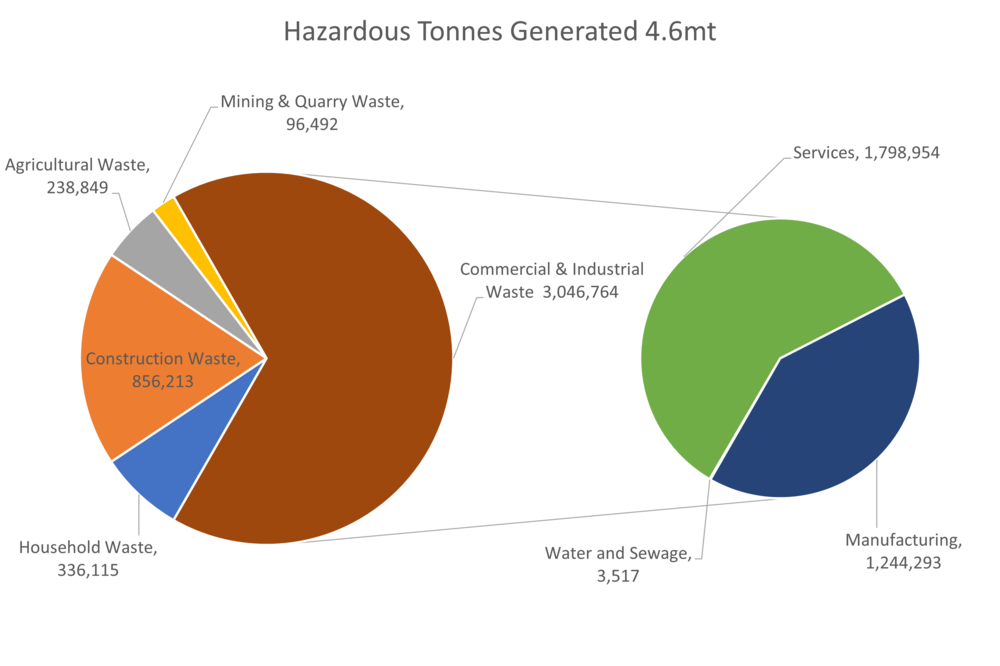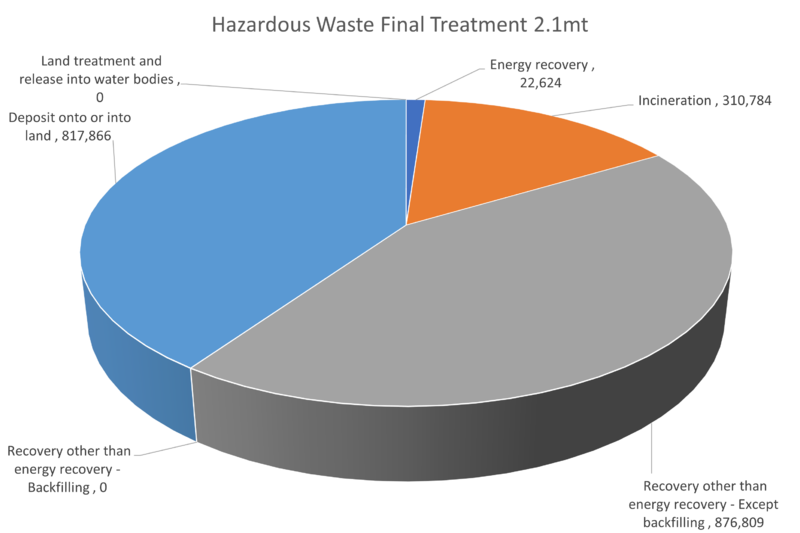Hazardous Waste
Hazardous Waste is defined within Art 3(2) of the Waste Framework Directive (WFD) as waste which displays one or more of the hazardous properties listed in Annex III (of the WFD). The macro Hazardous Waste tonnage reported by DEFRA for 2020 showed waste arisings of 5,400,255 tonnes.
Macro Tonnage
The macro-level data reported for 2020 by DEFRA[1] for tonnage arisings is summarised in the figure below, with a total of 5.4 million tonnes of Hazardous Waste arising in the UK:

Overview
Hazardous Waste is defined within Art 3(2) of the Waste Framework Directive (WFD) as waste which displays one or more of the hazardous properties listed in Annex III (of the WFD). Hazardous Waste is listed in the European Waste Catalogue (EWC) as a six digit code with an asterisk (*) e.g. 07 04 01*. Wastes are generally hazardous if they contain or exhibit properties which are hazardous to human health or the environment e.g. toxic, corrosive, mutagenic etc (Hazardous Properties).
Examples of hazardous waste as listed in the EWC are outlined in the table below (with the 2-digit code being the Chapter Title and the 4-digit code being the process giving rise to the waste):
| EWC | Description | STAT Group |
|---|---|---|
| 13 | OIL WASTES AND WASTES OF LIQUID FUELS (except edible oils and those in chapters 05, 12 & 19) | |
| 13 01 | waste hydraulic oils | Used Oils |
| 13 01 01* | hydraulic oils, contianing PCBs | Waste Containing PCBs |
| 13 01 04* | chlorinated emulsions | Used Oils |
| 13 01 11* | synthetic hydraulic oils | Used Oils |
Categories
When considering hazardous waste for 2020, 85% of hazardous waste was grouped into the following STAT groupings:
- Batteries and Accumulators 21%
- Discarded Vehicles 20%
- Chemical Wastes 17%
- Discarded Equipment 8%
- Soils 8%
- Used Oils 6%
- Mineral Waste from Construction and Demolition 5%
Treatment
Hazardous Waste requires specialist handling and treatment as defined within the Waste Framework Directive (2008/98/EC) and is regulated by the Hazardous Waste (England and Wales) Regulations 2005 in England and Wales and by The Special Waste Regulations 1996 and The Special Waste Amendment (Scotland) Regulations 2004 in Scotland. The same macro level data reported in 2020 showed the final treatment tonnage of 2.9 million tonnes was via the following destinations:

Historical Levels of Incinceration
The historical picture for hazardous waste incineration (all EWC codes as hazardous, excluding those EWC chapter 18 codes that are hazardous and included in the analysis on Healthcare Waste) is shown in the figure below for England only, with a significant proportion exported to R1 incineration and sent to the four High Temperature Incinerators (HTIs). This figure excludes hazardous waste to Cement Kilns. A listing of Hazardous Waste Incinerators is set out on the page High Temperature and Clinical Waste Incineration

